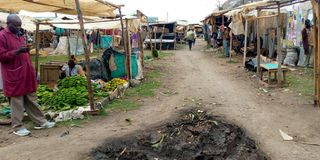The Laikipia County government has lost millions of shillings in uncollected revenue in a protracted standoff between officials and traders at the main open-air market.
At the centre of the controversy is the upgrading of the Thingithu market, partially funded by the World Bank through the Kenya Devolution Support Programme (KDSP) to the tune of Sh48 million.
Work that involved fixing pathways, drainage systems and water piping and installing electricity stalled last year after two of the three planned phases were completed.
In November last year, more than 1,000 traders stopped paying daily levies, arguing that the work was halfway done. Senior officials had said at the launch of the project that the money allocated was enough to complete the three phases.
“Governor Ndiritu Muriithi was present during the launch of this upgrading project on October 16, 2018 and announced that the funds set aside would be enough to complete the project,” said Mr Eliud Muchiri, former secretary of the market management committee.
“Since construction work stopped in March last year, we have been seeking an explanation in vain and that is when traders resolved to withhold the levies, which amount to about Sh60,000 daily.”
Mr Muchiri and his team was ousted a month ago after two decades in office in elections presided over by Finance and Planning Executive Murungi Ndai and Laikipia East sub-county Administrator Grace Kinyua.

A section of the Laikipia market that is yet to be upgraded on this photo taken on August 3, 2022.
Photo credit: Mwangi Ndirangu I Nation Media Group
Following the elections that were boycotted by most of the traders, the new office holders, led by new chairman Samuel Muriithi, pledged to mobilise traders to start remitting the daily levies to the county government.
But it has emerged that the new office bearers have not taken over and traders have not started paying the daily taxes.
“We know the elections were held and we were ousted by a section of traders pledging loyalty to senior county officials, but we have not been asked to hand over the office to the new team,” Mr Muchiri told the Nation on Wednesday.
“Our demands still stand – that we need piped water and have electricity connected here.”
When the elections were held on July 1, Mr Murungi, the Finance executive, explained that the funds allocated for the project could only complete the first two phases. He said more money would be set aside in the 2022/2023 financial year to ensure that all muddy pathways at the six-acre market were laid with cabro blocks.
Documents seen by the Nation show that between November 2020 and January 11, 2021, the project contractor was paid Sh36 million.
The payment was for construction of storm-water drainage, paving, and installing a water tank and electricity at the Nanyuki Old Market.
The Nation observed that the market does not have the 10,000-litre water tank that was supposedly installed there and is yet to be connected to electricity.